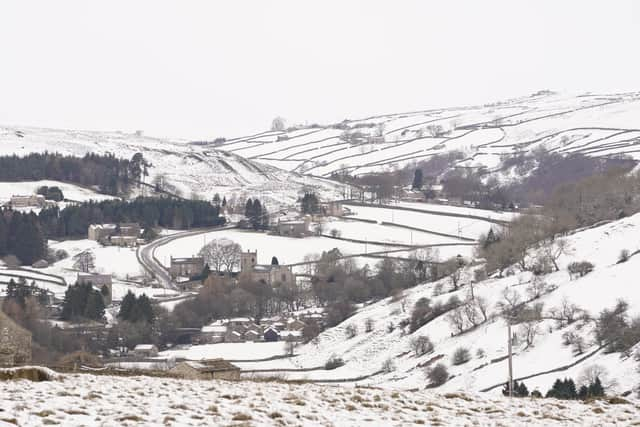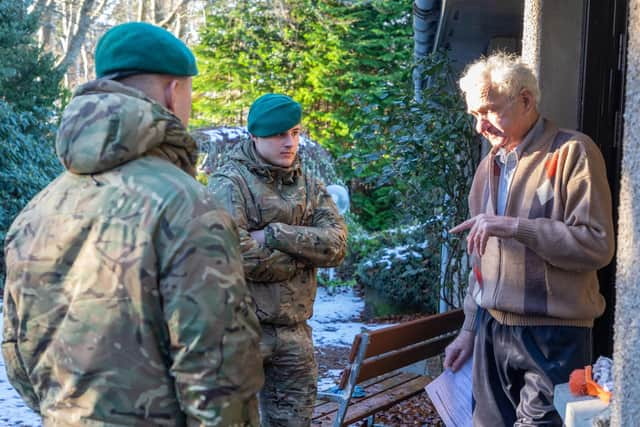Why Storm Arwen power cuts were warning over future energy crises if Ministers don’t act – David Blunkett


For many, it was the start of 10 days of misery. Storm Arwen was not the worst we’ve had. And there were warnings.
But nevertheless, it brought down trees, power lines, and with it, the electricity supply. Around 4,000 homes had still not had power restored by the beginning of this week.
What is known as an “outage” was on massive proportions.


Advertisement
Hide AdAdvertisement
Hide AdAnd yet, for days, the national media took virtually no notice, and the Cabinet emergency committee COBRA was not convened.
It took several days for a statement in the House of Commons, whilst families literally froze. So much for levelling up, when several days passed before a Government minister arrived on the scene!


Advertisement
Hide AdAdvertisement
Hide AdEven Conservative-led Richmondshire District Council has pressed the Government to take decisive action after hundreds of Yorkshire Dales residents lost electricity for several days.
A national emergency, which required a national effort, yet it took a week before it was declared a major incident, and a week before the military was called in.
The sheer absence of warmth, hot water, or means of cooking, came somewhere down the pecking order of leading politicians, television and radio, and it has to be said, the London-based print media.
Just think, for a moment, if this had been the south-east of England? When, as happened under David Cameron’s premiership, those along the Thames had found themselves inconvenienced by floods, “whatever it takes” was the commitment from the government of the day.


Advertisement
Hide AdAdvertisement
Hide AdNow take yourself 20 years hence when most vehicles will be electric, when the vast majority of houses will, in one form or another, depend entirely on electricity. Heat pumps, ground or otherwise, will be powered this way.
Many, in fact the vast majority of people, will have been persuaded to abandon their gas boilers, their gas hobs and their gas fires or stoves.
Open fires will be a thing of the past; log stoves, just a memory. The log stoves which have given some people a little heat over the last two weeks, enabling them to at least have warmth and warm water and huddle round to eat and sleep.
Unless – and I hope this happens – hydrogen can become an alternative for cooking as well as for the replacement of natural gas in terms of heating, there will simply not be another option, for most of us, in place of electricity.


Advertisement
Hide AdAdvertisement
Hide AdThat hope of an alternative is kept alive by experiments which include the research being undertaken jointly by the University of Sheffield and ITM power, a private company pioneering the use of hydrogen for both the production of steel, and gradually, a possible alternative for our domestic wellbeing.
But get this wrong, and God knows what the consequences will be – both in human suffering and in the political arena.
As I pointed out in my last article reflecting on COP26, there will always be those on the hard right of politics hovering to take advantage of not just disgruntlement but downright opposition to the measures through persuasion or imposition; to move away from sources of power that emit carbon and protect the planet.
Scientists talk about the possibility of increased frequency of storms like the one that caused havoc two weeks ago, ironically, an impact on climate that we’re already feeling.
Advertisement
Hide AdAdvertisement
Hide AdBut I’m concerned about the long-term consequences of a failure to plan for how we deal with something much more dangerous and, it has to be said, predictable.
I’m talking about deliberate malign attacks, terrorist or otherwise, on the sources of what will be, almost overwhelmingly, the only means of powering our lives.
From basic transport to warmth, eating, medical and other emergencies, a cyber, or more traditional, attack, could easily take out what we now take for granted, and bring modern society to a standstill.
Power lines above ground are not just vulnerable to future storms. They are, like the computerised central control systems, easy prey.
Advertisement
Hide AdAdvertisement
Hide AdI’m not predicting doomsday, I’m trying to think ahead in terms of what life would be like, if the 900,000 families originally finding themselves without electric power, turned out to be several million. The lack of forethought about how we would manage to rely on generators, what resilience and recovery plans exist, and whether the present timescales allow us to put in place the necessary alternatives is breathtaking.
Remember, personal or localised generators would have to run on something, and that something could not be oil or gas!
Sheffield University are also involved in nuclear small denomination reactors. They might contribute to such an alternative source of power.
After all, it is much harder to take out individual sources of energy generation than it is to take out the National Grid.
Advertisement
Hide AdAdvertisement
Hide AdBut I get no feeling that politicians, here or elsewhere, are up to the challenge.
So, as we come up to Christmas and hopefully celebrate together, let us hope the lessons of the failure to plan for the pandemic will not be repeated.
At the moment we have the chance to think ahead and get it right.
Prediction, preparation, planning and practicality must be the four “Ps” that map the future. Happy Christmas.
David Blunkett is a Labour peer and former Home Secretary.
Advertisement
Hide AdAdvertisement
Hide AdSupport The Yorkshire Post and become a subscriber today. Your subscription will help us to continue to bring quality news to the people of Yorkshire. In return, you’ll see fewer ads on site, get free access to our app, receive exclusive members-only offers and access to all premium content and columns. Click here to subscribe.
Comment Guidelines
National World encourages reader discussion on our stories. User feedback, insights and back-and-forth exchanges add a rich layer of context to reporting. Please review our Community Guidelines before commenting.